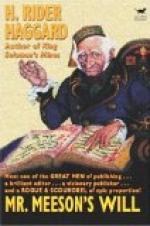Thus it was that, notwithstanding her success, Augusta had nowhere to turn in her difficulty. She had absolutely no literary connection. Nobody had called upon her, and sought her out in consequence of her book. One or two authors in London, and a few unknown people from different parts of the country and abroad, had written to her—that was all. Had she lived in town it might have been different; but, unfortunately for her, she did not.
The more she thought, the less clear did her path become; until, at last, she got an inspiration. Why not leave England altogether? She had nothing to keep her here. She had a cousin—a clergyman—in New Zealand, whom she had never seen, but who had read “Jemima’s Vow,” and written her a kind letter about it. That was the one delightful thing about writing books; one made friends all over the world. Surely he would take her in for a while, and put her in the way of earning a living where Meeson would not be to molest her? Why should she not go? She had twenty pounds left, and the furniture (which included an expensive invalid chair), and books would fetch another thirty or so—enough to pay for a second-class passage and leave a few pounds in her pocket. At the worst it would be a change, and she could not go through more there than she did here, so that very night she sat down and wrote to her clergyman cousin.
CHAPTER V.
THE R.M.S. KANGAROO.
It was on a Tuesday evening that a mighty vessel was steaming majestically out of the mouth of the Thames, and shaping her imposing course straight at the ball of the setting sun. Most people will remember reading descriptions of the steamship Kangaroo, and being astonished at the power of her engines, the beauty of her fittings, and the extraordinary speed—about eighteen knots—which she developed in her trials, with an unusually low expenditure of coal. For the benefit of those who have not, however, it may be stated that the Kangaroo, “the Little Kangaroo,” as she was ironically named among sailor men, was the very latest development of the science of modern ship-building. Everything about her, from the electric light and boiler tubes up, was on a new and patent system.




